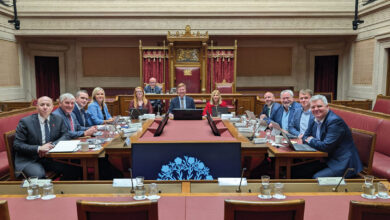Meet the Media
 The editor of the Ulster Gazette, John Hooks discusses his career in journalism to date and his time as a professional footballer.
The editor of the Ulster Gazette, John Hooks discusses his career in journalism to date and his time as a professional footballer.
How and why did you get into journalism?
I left school at 16 with dreams of building a career as a professional footballer. I was lucky enough to sign a contract for Southampton and spent a wonderful two years on the south coast of England. It was a privilege to be able to train with the likes of Matthew Le Tissier every day and live the life of a professional sportsman. I left Southampton and thanks to former Northern Ireland manager, Billy Bingham I moved to Blackpool, who at the time, were managed by Sam Allardyce. Billy Bingham was director of football and in my first year I made good progress at Bloomfield Road. However Allardyce was sacked and Gary Megson took over which was the beginning of the end for me. When my contract expired I moved back home where I had to make the hard decision of giving up on my dream of having a long career as a footballer.
I spent my final year in school going on trials to Glasgow Rangers, Crystal Palace, Hearts and Southampton so it’s fair to say my mind wasn’t on my school work. I left school with very few GCSEs. The only other thing that interested me outside of football was journalism so I enrolled at the Upper Bann Institute in Banbridge to study an NVQ Level Four in Newspaper Journalism.
The course was split between the classroom and placement. I was lucky enough to secure work placement at the Banbridge Chronicle – my cousin Bryan is the editor there.
On completion of the course I was offered a full time post at the Chronicle. A short time later I moved to the Banbridge Leader where I stayed for 12 years, working my way up to the Editor’s post for the last four years of my time there.
I always had an ambition to edit the Ulster Gazette as it was the paper I grew up reading so I jumped at the chance when it came along three years ago.
Having also dabbled in broadcast media what is it about newspapers that you are so passionate about?
 At UBI I trained alongside Siobhan McGarry and we became very good friends. Siobhan moved on to work for ITN on the local GMTV news in Belfast and I was lucky enough to join her there as a freelance. It was a great experience for me, but ultimately it made me realise that I preferred print journalism to broadcast. Maybe it was because time was so tight on such a short bulletin but I found that print gives a journalist a chance to really put their stamp on a story.
At UBI I trained alongside Siobhan McGarry and we became very good friends. Siobhan moved on to work for ITN on the local GMTV news in Belfast and I was lucky enough to join her there as a freelance. It was a great experience for me, but ultimately it made me realise that I preferred print journalism to broadcast. Maybe it was because time was so tight on such a short bulletin but I found that print gives a journalist a chance to really put their stamp on a story.
Please describe a typical week at the Ulster Gazette.
I’m not sure there is such a thing as a typical week at a newspaper and that is why I love the job. I’m always meeting new people and covering different stories which keeps the working week fresh.
Our week is very much geared towards Monday which is publication day and as a small team we will do everything from writing our stories to designing the pages. Mondays can be hectic!
Looking back over your career, what have been your most memorable stories and why?
I believe weekly newspapers really can play an important role in the community. The stories I have been most proud of are the ones which have helped people.
However one story which does stand out is the Neil Lennon death threat which led to him withdrawing from the Northern Ireland football team. As a fan, I was on my way to the game that night when I received a phone call from a source very close to the team who told me the players were just about to leave the hotel to head to Windsor Park when they were taken off the coach and informed that Neil Lennon had been threatened and was pulling out of the game. I was able to break the story to both the BBC and UTV who carried it at the top of their news programmes.
That was a dark time for local football but it is wonderful to see how far things have moved on today. It’s just a shame I won’t be In France working this summer – for a former footballer and fan turned journalist that would be the ultimate assignment.
Digital consumption of media is growing all the time, how is the Gazette embracing the digital revolution?
There seems to be a real rush to digital within the newspaper industry and yes consumption is growing at a fantastic rate. However, revenues aren’t growing at the same rate. We have a strong presence on social media as I think it is very important to have that immediate connection with our readership and we are working to develop our website but the Ulster Gazette adopts a print first approach to publishing.
People talk about the decline of the newspaper industry but we maintain a very healthy circulation along with strong advertising revenues. We want to do all we can to protect those.
We firmly believe print still has a future. Yes there are now so many more demands on people’s time and newspapers have to fight for their share, but if we continue to break stories which are relevant to our readers then we will continue to enjoy the support of the local community.
How do you spend your free time?
I have two young sons, Jack and Tyler who are aged five and six, so free time is a rare thing. However there is nothing better than coming home to the boys in the evening and spending the weekends with them – I just can’t get them to kick a football at all. My wife Vicki and I are both big lovers of Italy and Tuscany in particular. We are planning a family holiday there this year which is something we are all looking forward to. I also enjoy watching football and it has been unbelievable to see Northern Ireland qualify for the Euro finals. It is going to be a summer to remember.





